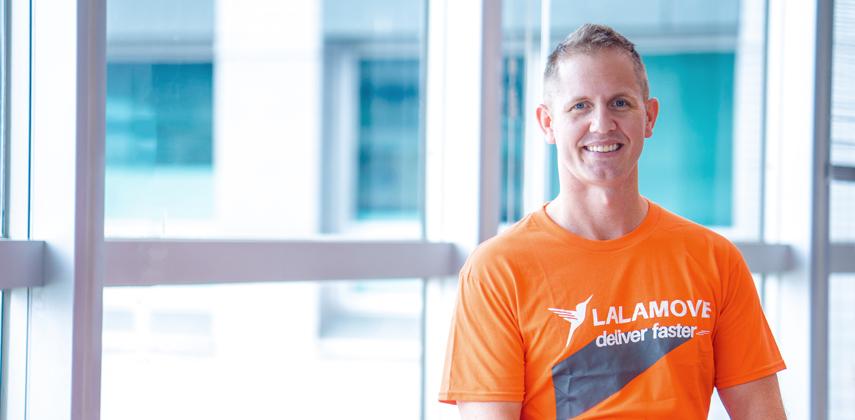When a start-up finds the right formula and the market responds, the rate of growth can be spectacular. That’s something Blake Larson can readily confirm and, as managing director of Lalamove, a tech-based firm which offers local delivery services, he is planning to ride the wave.
“My personal mission is to help us open in another 100 cities in the next two years,” he says. “There is skyrocketing demand as customers look for better pricing and faster service and, so far, we haven’t found it too difficult to launch in any city we’ve tried.”
Those customers range from SMEs and people moving apartment or buying second-hand goods to contractors supplying parts and even the large third-party logistics providers.
In simple terms, they access a platform and specify the job. Details are then seen by available drivers who respond, confirming the time slot, pick-up location and price. A number of filters ensure orders go to drivers with the right type of van, truck or motorcycle, and everything falls into place.
“That is where the technology comes in, to better match supply and demand in real time,” Larson says. “We can source a driver in 30 seconds, and we try to create a very transparent system to ensure trust and reliability, which is very important for our business.”
Founded in 2013, the Hong Kong-based firm already operates in 260 cities. In round numbers, it now has close to 5,000 employees, a pool of 2 million drivers, and 15 million registered users of the platform. When considering new markets, the initial steps include a look at the compliance environment, how organised or fragmented the delivery space is, and the likely “pain points” for drivers, whose vehicles are their main source of income.
“We see them as entrepreneurs with a value system very much aligned with ours,” says Larson, whose challenge is to maintain 300 per cent year-on-year growth while continuously reinventing product feature and technology. “We realise they want income, freedom, flexibility and respect.”
Originally from a small town in central Kansas, a land of corn, wheat and farming communities, Larson moved when nearly 10 to Chicago, where his father was in accounting and his mother worked for a non-profit.
As early dreams of a pro basketball career gradually faded — “you start seeing people twice your size” — he fell back instead on a liking for numbers, which led in due course to a double major in finance and marketing at the University of Iowa. On graduating in 2004 with, he admits, a still somewhat limited worldview, he opted to follow the approved and obvious path, which meant joining retail pharmacy chain Walgreens. It was, though, a fortunate choice as, assigned to the real estate team, he was tasked with identifying suitable locations to open a target of 500 new stores around the US.
“Doing that involved a lot of strategy, communication and upfront research,” he says. “I went out to different cities, noting on maps what was on every corner, what was opposite, and where competitors were. I would then present the findings to senior management in a wood-panelled main boardroom for them to decide.”
Subsequently, he moved to a finance role overseeing budgets for the in-house marketing group, but by then he was starting to have second thoughts. In particular, he noticed how his boss’s boss, while no doubt on a good salary, never looked happy, and there was a sense of the walls closing in,
“I felt there was still so much to explore; I wanted to leave the US and do something different,” he says. “I wanted to put my time into something I was passionate about and which could have an impact.”
Having applied unsuccessfully for jobs overseas, he therefore signed up for an MBA at ESADE Business School in Barcelona, where he had previously explored the possibilities during his honeymoon. The programme included an eye-opening internship with the Clinton Foundation in South Africa and concluded with an exchange at the National University of Singapore in 2013.
After that, Larson took a further four months to look around Asia. He was astonished by the rate of change and the opportunities, especially in Hong Kong, where the dynamic pace of the city and the general scene convinced him to stay on. He soon found an opening with German firm Rocket Internet, a tech incubator which was developing a ride-hailing business. Then, six months on, the call came from Lalamove.
At that point, the firm had around 12 employees, and its initial promotion campaign was just kicking off. But Larson could see the ambition and the potential.
“We hit it off, and I spent the first month talking to shop owners, putting stickers on vans, and walking around with signboards,” he says. “You do whatever you have to, throw it all at the wall and see what sticks.”
For such a new concept, there were no immediate benchmarks, but orders per day were soon climbing and, importantly, the drivers kept coming back
“There was no monumental moment where we said this will work, and we’ve never fully stopped worrying,” he says. “We’re pretty stable now and growing fast, but it’s a huge responsibility when livelihoods are involved and a lot of people depend on you. That, though, is what keeps you thinking about how to improve. You can't take it lightly and, in a sense, it’s an honour.”
With a two-year-old daughter, most of Larson’s off-duty time centres on family, but he is also a keen trail runner and currently training for February’s “Sai Kung 50” race.
“It’s pretty brutal, but for me it’s about pushing the boundaries,” he says. “I have a fear of becoming too comfortable. It comes from some core need for personal growth, so I put myself in these situations, such as skydiving, which test you physically and mentally and where you have to conquer your fears.”


